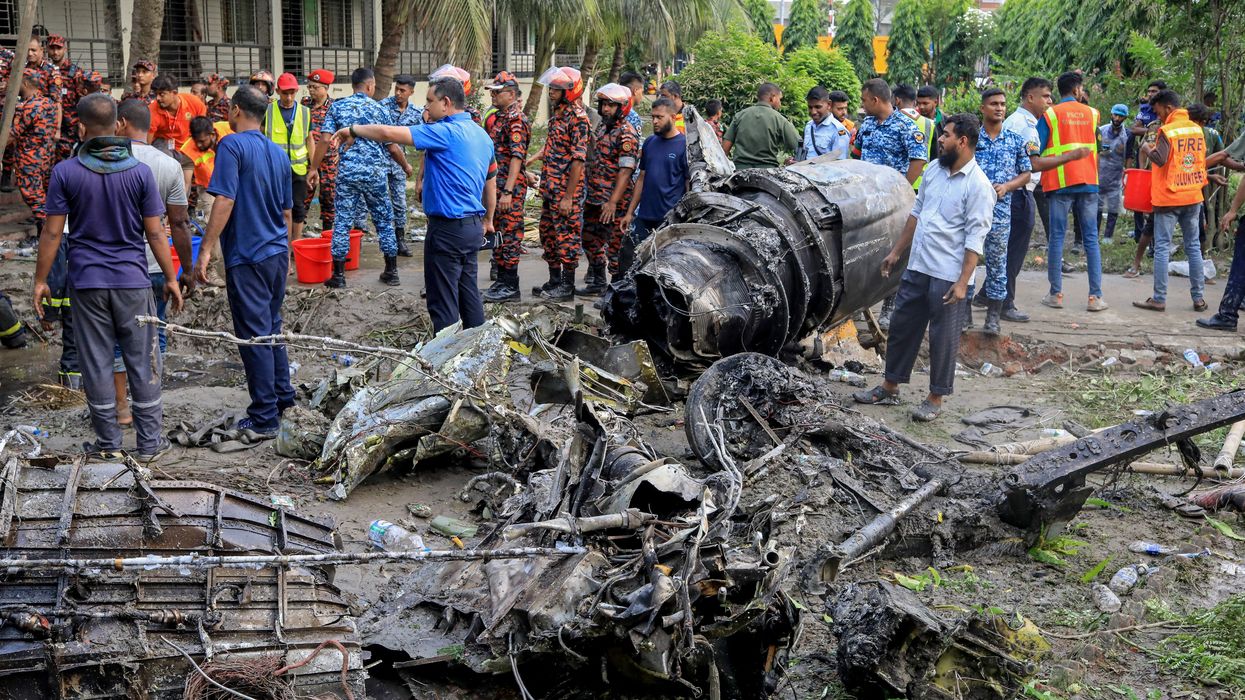Highlights:
- Fighter jet crashes into school building in Dhaka
- At least 20 killed, over 170 injured, including children
- Aircraft reportedly suffered mechanical failure
- Bangladesh declares national day of mourning
AT LEAST 20 people were killed and more than 170 injured after a Bangladeshi fighter jet crashed into a school in Dhaka on Monday. It is the deadliest aviation accident in the country in decades.
The crash took place at Milestone School and College when a Chinese-made F-7 BJI fighter aircraft slammed into the building shortly after students had been let out of class.
An AFP photographer at the site saw fire and rescue teams carrying away injured students on stretchers. Army personnel were seen assisting in clearing the debris.
According to a military statement, the crash killed 20 people, including the pilot, and injured 171 others. The incident occurred after the aircraft experienced a mechanical failure.
Shafiur Rahman Shafi, an 18-year-old student, said he heard a loud blast.
“There were two fighter planes... Suddenly one of the two planes crashed here (in the junior playground),” he told AFP.
“It created a boom, and it felt like a quake. Then it caught fire, and the army reached the spot later,” he said.
The private school provides education from kindergarten to senior secondary level.
Mohammad Maruf Islam, joint director of Dhaka's National Burn and Plastic Surgery Institute, said most of the injured were between eight and 14 years old.
Grieving families gathered at the hospital, and volunteers lined up to donate blood.
Tofazzal Hossain, 30, said his cousin was among those killed.
“We frantically searched for my cousin in different hospitals,” Hossain told AFP.
“He was an eighth grader at the school. Finally, we found his body.”
The military said the pilot was on a routine training mission and “reportedly encountered a mechanical failure”.
“The exact cause remains under investigation,” it said.
The military added that the pilot tried to avoid a densely populated area but “despite his best efforts” crashed into the two-storey school building.
The interim government, led by Muhammad Yunus, announced a national day of mourning on Tuesday.
Yunus said he felt “deep grief and sorrow” over the crash in a post on X.
“The loss suffered by the Air Force, the students, parents, teachers, and staff of Milestone School and College, as well as others affected by this accident, is irreparable,” he said.
“This is a moment of profound pain for the nation.”
The crash is the worst aviation accident in Bangladesh in several decades.
The deadliest incident in the country occurred in 1984, when a plane travelling from Chattogram to Dhaka crashed, killing all 49 people on board.
Last month, a commercial aircraft crash in India killed 260 people.
Indian prime minister Narendra Modi said he was “deeply shocked and saddened at the loss of lives” in Dhaka.
Relations between India and Bangladesh have remained tense since Sheikh Hasina, a long-time ally of New Delhi, was ousted by protesters last year.
“India stands in solidarity with Bangladesh and is ready to extend all possible support and assistance,” Modi posted on X.
(With inputs from agencies)





